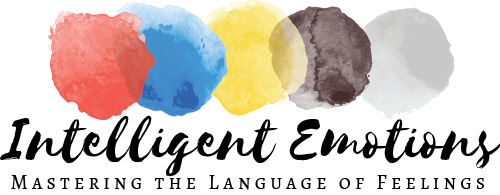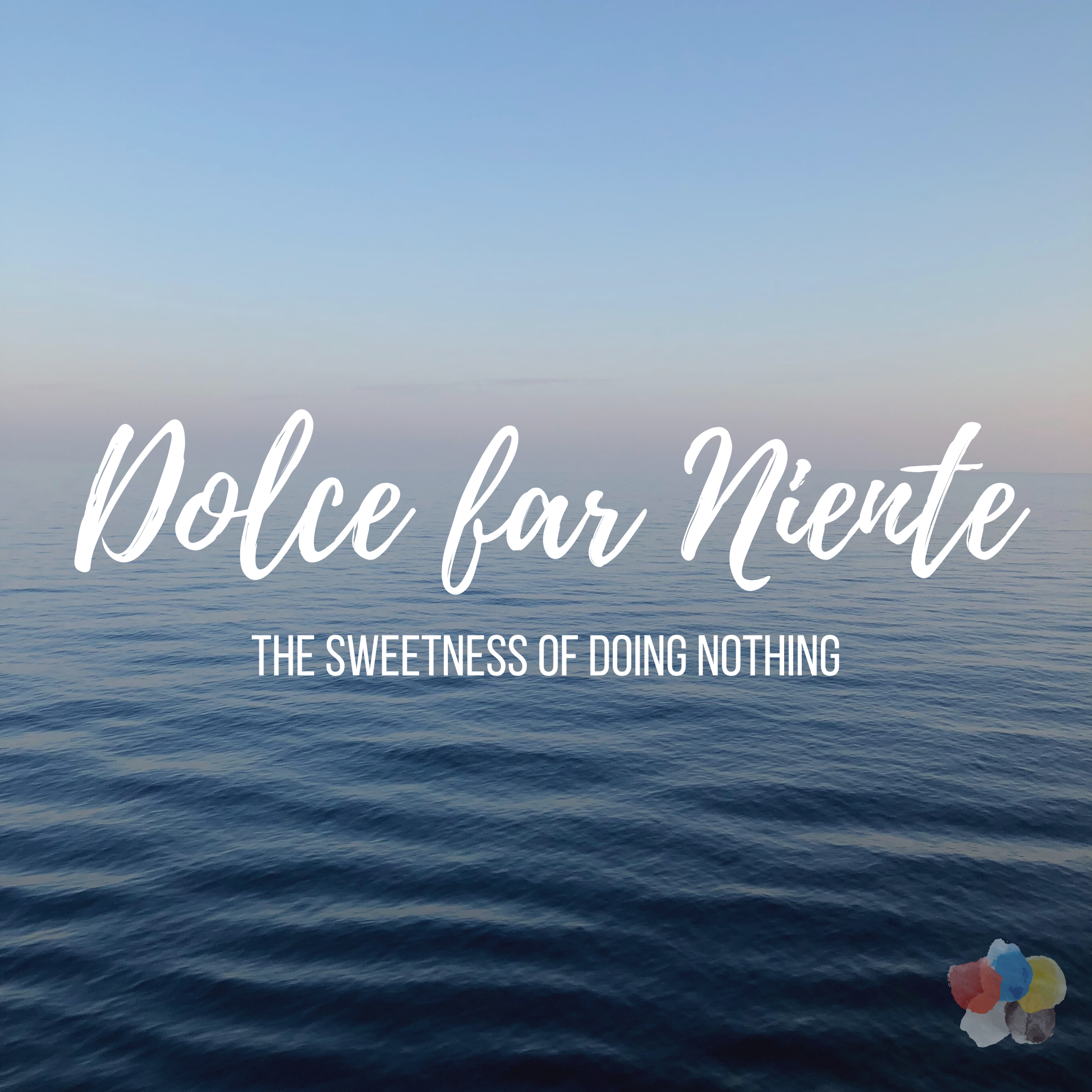Feeling Emotionally NUMB: The Emotion of Recentering
Are you feeling nothing, or do you find yourself feeling emotionally numb? Emotional numbness often signals a state of overwhelm and says, “There is TOO MUCH.“ Let’s talk about what it really means to feel empty and numb inside and learn 4 ways to care for yourself by making things LESS.
When Feeling Emotionally Numb… You Need LESS
Numbness is an interesting emotion because often it doesn't get registered as one.
When I ask people,
"What are you feeling right now?"
often the response is,
"I'm not feeling anything."
So, in response to that, I give up a follow-up.
"Is it that you're not feeling any emotions right now?
Or is it that you're actually feeling NUMB? Because numbness is a feeling.”
Then they kind of think about it and say,
"Yeah, I feel like there's a lot of stuff going on, but I kind of feel fuzzy or hazy."
When emotional numbness kicks in, the main message that this emotion of recentering is communicating is that there's TOO MUCH.
There's too much stuff going on, there's too many things to pay attention to, too many voices, and it's really important to translate that into saying what you're needing.
Numbness says that there's too much. So when numbness kicks in, what you're needing is LESS.
The Four S’s of LESS
Now, the emotion of numbness is not bad, as it can act kind of like anesthesia where there's kind of this dampening effect. It helps to regulate how we are so that we can kind of tune everything out and, ideally, zoom in on what we really need to be focusing on.
But when emotional numbness kind of interferes with our day-to-day life, it's really important to intentionally give yourself LESS so that you’re not constantly anesthetized.
So there are four ways of giving yourself the gift of LESS - the Four Ss of Less:
Silence
Solitude
Stillness
Simplicity
Silence - Less Noise
When there's too much noise—either literal sounds in our environment or there's too much chatter on the inside, too many thoughts going on, too many opinions, too many cooks in the kitchen around a particular decision—silence means that we REDUCE the noise. We listen in to that one quiet, still voice that we really need to tune into. And we do that by drowning everything out.
Now, I'm also a Highly Sensitive Person, so I have a lot of sensitivity to physical sound. I literally have earplugs everywhere. I have them at home, I have them at work, and having them helps me to tune out everything so my body's not constantly bombarded by all these sounds that are happening.
So, whether it be literal sensory sounds or if you're trying to make an important decision but there are too many other people's opinions, then sometimes it helps for you to take some time to tune out everyone else's opinions. And when you disconnect from the noise, you can really focus on what you want and what you need and find an emotional connection.
Solitude - Less Others
When I recommend that someone practice solitude, they're like, "Well, I don't want to feel alone. I already feel alone. I don't want to feel lonely." But there's a huge difference between solitude and loneliness.
LONELINESS is not being around other people and also not connected with yourself.
SOLITUDE is also not being around other people, but specifically to connect with yourself.
When’s the last time you’ve taken a good sweet two hours where you're not attending to anyone else? Where you're not focusing on other people's emotions or needs? And you're not trying to like reach out to other people because sometimes that can pull us outside of ourselves.
Solitude means reconnecting with yourself and with what you want and what you need. That's a really important discipline.
Give a good chunk of time to yourself and deliberately build that into your schedule. See what happens with your emotional numbness — chances are that it’ll naturally dissipate because you’ve given yourself what you need.
Stillness - Less Busyness
I'm a therapist in Silicon Valley and also an entrepreneur, so stillness is a really hard thing for me because I'm constantly on the move. It’s no wonder why I often feel so overwhelmed and emotionally numb, because I’m not paying attention to myself.
Think about Silence in terms of thoughts, Solitude in terms of feelings, and Stillness in terms of doing.
STILLNESS is a particular discipline of NOT DOING. It’s the act of not packing in your schedule with all these things that need to happen.
Sometimes we don't really need to do those things, but you know, especially in environments where busyness is taken as a badge of honor, it's really important to counter that culture by deliberately putting in time where you're purposefully doing nothing, or dare I say purposefully being anti- or counterproductive. Why? Because you’re a human BEING, not a human DOING.
Now, I have workaholic tendencies, so this is really personally difficult for me because I have a lot of anxiety that comes up when I'm still. That's probably indicating that I need to be still more often because again, numbness kicks in to drown out certain, really important emotions that really require our attention.
So, take a bird's-eye view on your schedule and ask yourself,
"Is this too full? Is this too busy?
Am I constantly driving from one thing to the next?
Do I seem like a chicken with its head cut off?"
It might help to deliberately schedule time for you to do nothing.
If you start feeling empty or numb, monitor your level of activity and busyness. Try not to stuff your schedule with all these activities where your body could use a lot of rest. It's not going to get a lot of rest until your body gets sick. Rest on purpose and your body won't force you to.
Simplicity - Less Clutter
As an idealist, I often focus on what things COULD BE, so I end up hyper-compressing things in a very small window of time, daisy chaining one activity with the next. Or I create all these arbitrary preconditions to get a thing done so I think I'm being productive, but I'm actually procrastinating because I've added in all these other conditions that don't actually need to be there.
So as an example, let's say I need to go to the grocery store and my thought is, "Well, I'm already going to be out, so I may as well stop by the UPS store and drop off this amazon package that I need to return anyway, and you know while I'm there at the store, how about I listen to this podcast or how about I also call up a friend or whatever."
I'm adding too many things onto one thing that could stand alone by itself. So, if you find that's your tendency, then it'd be an important discipline.
Practicing doing one thing at a time is something I need to work on. Otherwise, my body is going to be screaming on the inside and it’s going to require for numbness to kick in. Numbness might be helpful in the moment in that it helps us drown out some things that we don't want to pay attention to, but the role of emotions is actually to catch our attention and to deliver a message.
Give Yourself What You Need
Which of the four S’s of doing less stands out most to you? Once we're able to give ourselves what we actually need, then we're less likely to be reactive or to end up feeling emotionally numb. When we're less reactive, there's so much more that we can do that's actually beneficial for us and also for other people.
The BIG Feelings Chart
Not sure what to do when any of the BIG 5 Feelings show up?
Grab this free PDF chart that shows you what to do with MAD, SAD, GLAD, SCARED, & NUMB!
If you liked this post, Pin it to Pinterest!
Other Blogs on Numbness
© Copyright 2023 Joanne Kim. All rights reserved.
Joanne Kim, Feelings Translator
Hi! I’m a therapist-turned feelings coach who helps Highly Sensitive Persons, Empaths, Enneagram 2s & 4s, etc. turn their BIGGEST feelings into their GREATEST superpower!
They are often the first (or only) person in their family to intuitively process and express feelings; consequently, they are often judged or criticized so that they learn to people please, placate, or perform until they hit a wall.
They’re super familiar with anxiety, guilt, and shame, partly because of an allergic reaction to anger (theirs and others').
Often the super responsible, empathic, and ethical person in their environments, they reach out to me after they're already burned out, resentful in their relationships, or sucked into their shame spiral.
The most common feedback I get from people when I share about how feelings work is,
"Why didn't anyone teach me this in school??"
Hence, I am building a school helping people work WITH their feelings so their feelings work FOR them.














Feeling overwhelmed, lost, or overwhelmed? The 3 Rs of Routines, Rhythms, & Rituals can soothe your frazzled nervous system and help your body settle into a smoother rest state.